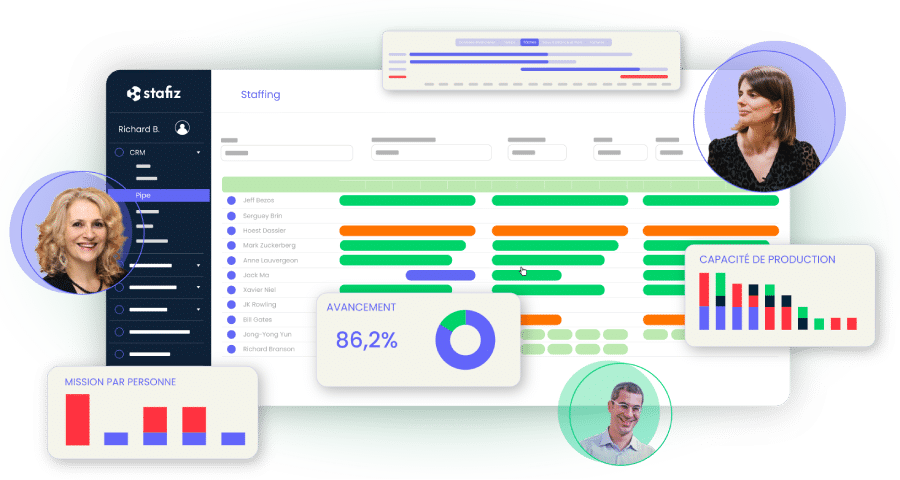Sell consulting engagements with power
Professional service automation
6 crucial steps to successfully sell projects
Selling consulting projects, a complex process? By nature, the sale of a project is much more human and manual than other types of sales. The approach, the exchange and the relationship are at the heart of purchasing decisions for a consulting mission.
In a consulting firm or agency, everyone has to be a salesperson. So don't hesitate to share this post with your employees!
1. Sell custom-made
Do you want to sell a packaged product because it has already been successfully produced and executed? This can work when the requests are always very similar: an SEO audit of a website or a specific training for example.
But that's not always what suits a customer.
The easiest way to sell a consulting assignment is to offer the service that the client really, genuinely and totally needs.
Selling a project is not like selling a product that has non-modifiable features. A consulting mission can, on the other hand, be fully adapted to the client's needs.
It is therefore necessary to listen long and actively to the issues, discuss the project, understand the client's objective in depth, before offering him the service he really wants.
In a word, make it tailor-made...
2. Train employees in sales
Selling a consulting assignment is not within everyone's reach. This requires sales skills that are not necessarily natural.
Fortunately, these skills can be learned. It is therefore necessary to train the employees of a consulting firm or agency in sales so that they are able to sell projects as early as possible in their careers.
Even if it is only additional work during a mission.
It is therefore necessary to spend time explaining the sales process to consultants and managers, offering them the opportunity to read suitable books, and coaching them regularly on the subject. This is an additional chance to motivate them by showing them early on that it is possible to sell projects or work.
3. Assist the customer during the sales phase and be transparent
Frequently, the client goes through a research and tender phase. Being too aggressive during this phase is counterproductive. On the contrary, we must be as transparent as possible and provide them with all the necessary help in the research phase
For example, we need to talk about the risks of the project. A bad salesperson will hide the possible chances of failure of the mission, while a good consultant will explain what are the possible limits to give the client all the visibility.
The feeling of transparency and honesty will help create a bond of trust that will support the sale of the project.
4. Practice active listening
You have to push the customer to share everything: their difficulties, their frustrations, their problems and their ideas. The more you let your customer express themselves, the easier you will make it to prepare your proposal. To do this, you need to practice active listening.
- Follow up with the customer when they express a problem
- Dig deeper into the implications of this problem with him by asking:
- What is the impact on your productivity?
- Does this lead to a lack of efficiency?
- What is the loss for your company? …
Not only that, little by little, the customer will take into account the extent of the problem and his urgency to solve it. But when you make your proposal, you will be able to respond to each of the implications of the problem and not just a generalist answer.
This will have a much greater impact than that of your competitors.
5. Build trust
Consulting clients don't just buy a service. You have to remember that they buy you.
One of their first objectives is to reduce the risk.
The cost of a consulting assignment can be high, and no one wants to be responsible for a costly failure. Demonstrating professionalism is a matter of course, but it also means building a relationship and building trust.
It is not possible to build trust in a sales relationship without creating an emotional bond.
You have to be able to get out of the purely professional link, show that you are able to offer something that will improve the business without expecting anything in return. You are able to offer it without it being asked.
It is also necessary to:
- Succeed in getting out of the strictly professional conversation
- Show empathy
- Create a more memorable exchange than the competition
- Being vulnerable can have a very positive effect.
Read our article on Why hire a consultant
6. Understand the buying dynamics
It is important for the person making the offer to understand how the buying process will unfold at their customer's home. You have to know who is going to carry out the call for tenders and make the first filter. This person is obviously key since he will give his impression. Make this person your "internal champion".
But a large part of the sale happens without you being able to intervene. To understand who the final decision-maker is and help your "champion" sell you, you still need to know precisely who will make the purchase decision. For example, you can ask the following questions to establish the purchase process:
- Have you already set a budget for this project?
- What results are expected?
- Are you in charge of presenting your employees with the responses to your call for tenders?
We must also be fully aware of the political aspect of decisions. Buyers tell you about some of their decision-making criteria (price, experience, etc.), but rest assured that internal policy has a very important role. You should not underestimate the possible connections to be made, the alliances to be created with other people in the client company to ensure that you have not one but several "champions" who will advocate for you at the time of the final decision.
5 Mistakes to Avoid When Selling Projects
1. Respond to a customer's problem immediately:
Too often, when they want to show their firm's experience, consultants will immediately highlight the actions to be taken to respond to the problem a client is talking about.
This must be avoided at all costs and must go through each step: understand the implications of the problem, the financial impacts and the extent of the problems.
Only then should you start writing an offer. This will carry much more weight once the specific consequences of the problem for the customer are known.
2. Not letting the customer talk enough:
Everyone wants to speak in a discussion, even more so when you want to demonstrate your worth. But it's important to remember that when it comes to talking to your customer, it's counterproductive. The customer needs to feel heard and understood.
If you let your customer speak, he will not only provide the expected answers to his problem on his own, but he will also be satisfied with the listening you give him.
It's not magic, it's just human. A conversation where the customer talks 70% of the time is more likely to result in a sale than the other way around.
3. Not building the relationship at the time of sale:
As we have seen, the customer chooses a relationship that goes beyond a purely pragmatic choice based on numerical data. During this phase, it is necessary to build a relationship and give an overview of what the client can expect during the project: professionalism, empathy, ...
4. Don't leave your comfort zone:
To sell well, you have to constantly innovate and test new approaches.
In consulting, as in any other sector, you have to analyze the effectiveness of different sales channels, package the offer in a different way, try new tools that can facilitate sales (CRM and marketing automation tools, etc.).
Finally, the result of each approach must be analyzed, in order to accelerate on those that work best.
5. Overestimating the cost issue:
53% of salespeople think that the cost of the product is the cause of the failure of the sale, while in reality, only 7% of customers cite the cost of the project as the essential criterion in their refusal to use the consulting firm.
Article on the consulting market in 2021
Learn more about Stafiz for Consulting
You might be interested in other articles

Optimizing Customer Relationship Management (CRM) with Stafiz: the case of Artimis
Natalia Duarte...

